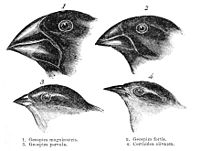
Photo from wikipedia
Evolutionary developmental biology (evo-devo) formed due to the interactions of evolutionary biology, paleontology, and comparative genomics, analyzes the interrelations of ontogenetic and phylogenetic processes and, primarily, the influence of changes… Click to show full abstract
Evolutionary developmental biology (evo-devo) formed due to the interactions of evolutionary biology, paleontology, and comparative genomics, analyzes the interrelations of ontogenetic and phylogenetic processes and, primarily, the influence of changes in individual development are under genetic control, and Hox genes play a decisive role in the determination of animal’s body plan. Both genetic and epigenetic mechanisms underlie the regulation of body plan formation in ontogeny and phylogeny, and the latter mechanisms ultimately determine the animal’s phenotype. Heterochronies, which create the differences between related taxa (species and genus), play an important role in the evolutionary transformations. Data from paleontology, evolutionary biology, and genomics enabled the construction of a phylogenetic system that includes the time of divergence of evolutionary branches of different ranks, in addition to the evolutionary innovations.
Journal Title: Paleontological Journal
Year Published: 2019
Link to full text (if available)
Share on Social Media: Sign Up to like & get
recommendations!